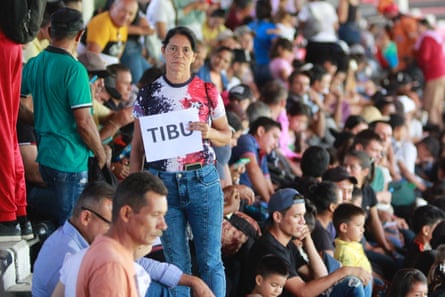Authorities in the Colombian border city of Cúcuta are scrambling to cope with an influx of internal refugees, as thousands of civilians flee an outbreak of fighting between rival rebel factions.
Buses, trailers and dump trucks packed with disoriented mothers and children have been streaming into the border city since Friday when the bloody conflict began engulfing north-eastern Colombia.
“We have received [displaced families’] when violence has flared up in the region before but nowhere near this level. We are talking 15,000 people arriving in the city in just four days. This is historic for Cúcuta, but sadly even for the country,” said the city’s mayor, Jorge Acevedo.
At least 80 people have been killed and 32,000 displaced as the ELN, the world’s oldest active guerrilla group, seeks to purge one of Colombia’s largest cocaine hubs of rival factions.
Rights groups say civilians are being targeted by the ELN and the 33rd Front, a band of dissident rebels who have refused to disarm in a 2016 peace process. Fighters have gone door to door seeking sympathisers of rival factions, said Iris Marín Ortiz, Colombia’s ombudsman.
The warring groups are launching “indiscriminate attacks on combatants and civilians who are accused of collaborating with one group or the other simply because they are family members or people close to them”, Ortiz said.
Meanwhile, at least 20 people have been killed in fighting between warring drug trafficking factions in the jungle region of Guaviare.
Colombia’s president, Gustavo Petro, said on Monday that he would declare a state of “economic emergency” to free up funds for the humanitarian crisis as refugees continue to pour into Colombian towns and across the border into Venezuela.
Petro also pledged to announce “a state of internal unrest”, suspending the rule of law. The drastic measure was used by former Colombian leaders at the turn of the century when armed groups controlled vast swaths of the country and were encroaching on the capital.
The bloodshed is one the worst episodes of violence in Colombia in recent years and has stretched the capacity of local authorities.
“Some people are arriving fully dressed but others are dirty in just a pair of shorts with no shoes. They were left running with whatever they had in their hands so they need help with absolutely everything,” said Cúcuta’s secretary of post-conflict, Leandro Ugarte.
Local authorities are assessing the migrants for treatment and accommodation at the local football stadium as it is the only venue large enough in the city to receive so many people.
“There is nothing I can compare this to. It’s a tsunami of people,” he said.
The Catatumbo region is accustomed to bloodshed due to its extensive coca crops and strategic location on the Venezuelan border, but even by the lawless region’s standards the unrest has shocked the country.
“We are facing one of the largest and most serious humanitarian crises that Catatumbo has ever faced, if not the largest,” said Ortiz.

About 46,000 children are now out of school, and families are unable to even reclaim the bodies of loved ones for burial.
A 2016 peace deal with the Revolutionary Armed Forces of Colombia, the Farc, ended 60 years of war with the country’s largest guerrilla army.
But since then, the peace process has withered and new groups with weaker political ideology and fewer moral scruples have ruthlessly filled the Farc’s power vacuum, recruiting children to swell their ranks. Petro broke off peace talks with the ELN on Friday, and on Wednesday prosecutors reactivated arrest warrants for 31 of the group’s top commanders, which had been suspended to enable talks.
“For the last three years, we have warned about a deterioration in Colombia’s conflict that risked sparking a new cycle of war,” said Elizabeth Dickinson, senior analyst Andes Region at the NGO Crisis Group in response to the violence in Catatumbo. “We are very concerned that moment is now.”
Petro, a former guerrilla himself, had pledged to finally end the conflict by negotiating with armed groups but the rupture of negotiations with the ELN could be the final blow for his dovish approach.
Thousands of soldiers have been dispatched to the Catatumbo to restore order, but they have so far made few inroads as rival groups continue battle one another.
“We hope that, this time, when the army gets in they will stay there and take control of the territory once and for all – as it should be,” said Acevedo. “But so far it seems they have made little progress.”
An additional 1,000 displaced people arrived in Cúcuta on Tuesday, Acevedo said.

